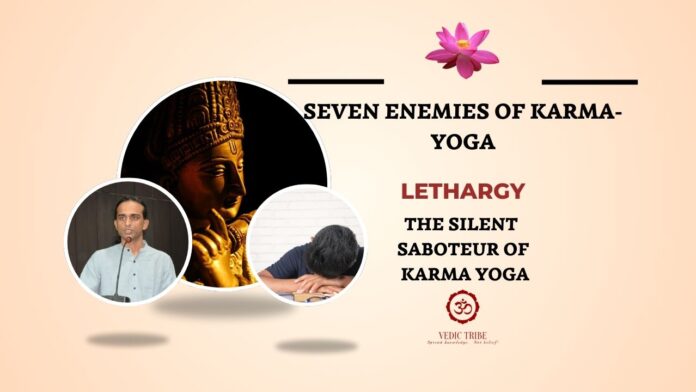Lethargy: The Silent Saboteur of Karma Yoga
In the previous article we understood what is Karmayoga and how equanimity of mind is essential in the said practice. In this article we will discuss the enemy of Karma-yoga i.e., Lethargy.
One significant reason for lethargy, particularly for those practicing karma yoga, is the absence of the adrenaline rush that typically accompanies result-oriented actions. When we detach ourselves from the outcomes of our actions, we inadvertently deprive ourselves of this natural motivator.
Lack of adrenaline:
Adrenaline: When we engage in actions with a strong focus on the outcome, our bodies release adrenaline, a hormone that prepares us for a “fight or flight” response. This surge of energy motivates and helps us stay focused and energized.
The daunted: However, when we practice karma yoga, we detach ourselves from the outcomes of our actions. This detachment leads to a decrease in the adrenaline rush, as there’s no specific goal or reward to strive for. While this detachment is essential for spiritual growth, it can sometimes lead to a sense of lethargy or lack of motivation.
Detachment: It doesn’t mean apathy or inaction. It means performing your duties with dedication without clinging to specific outcomes or expecting rewards. However, the very act of not expecting reward reduces the adrenaline infusion and makes us lethargic.
Conquering Lethargy: The Power of Deliberate Practice
To combat this insidious enemy, we must turn to “abhyasa”, or deliberate practice.
The concept of “deliberate practice” in psychology, most notably popularized by Anders Ericsson, goes beyond simply “putting in the hours.” It’s a highly structured and focused approach to skill development. This concept is very useful for a Karma-Yogi in combating lethargy:
Intentional Action: Consciously choosing to act, even when we feel unmotivated.
Consistent Effort: Maintaining a steady pace of practice, regardless of external circumstances.
Focused Attention: Directing our full attention to the task at hand, avoiding distractions.
Self-Discipline: Fixing a routine.
Deliberate practice involves consistently pushing beyond your comfort zone and tackling challenges that are slightly beyond your comfort zone.
Benefits:
By engaging in deliberate practice, we can:
Build Momentum: Consistent action, no matter how small, can create a positive momentum that carries us forward.
Develop Discipline: Regular practice strengthens our willpower and self-control.
Experience Flow States: As we become more skilled, we may enter a state of flow, where time seems to disappear and we’re fully immersed in the activity.
As a spiritual discipline:
Deliberate practice is not just a technique for improving skills; it’s a spiritual discipline. By engaging in consistent, focused action, we can:
– Maintain equanimity of mind
– Perform actions without attaching to results
– Contribute to the wellbeing of society at large
– Ceaselessly practice Karma-yoga and connect all our actions with the divine.
To do:
– Check whether lethargy has creeped into you due to practice of detachment from the worldly affairs.
– Adopt deliberate practice and push yourself.
In the next article, we will discuss the enemy “Mental Exhaustion”.
Madhwesh K
Vedic Tribe

